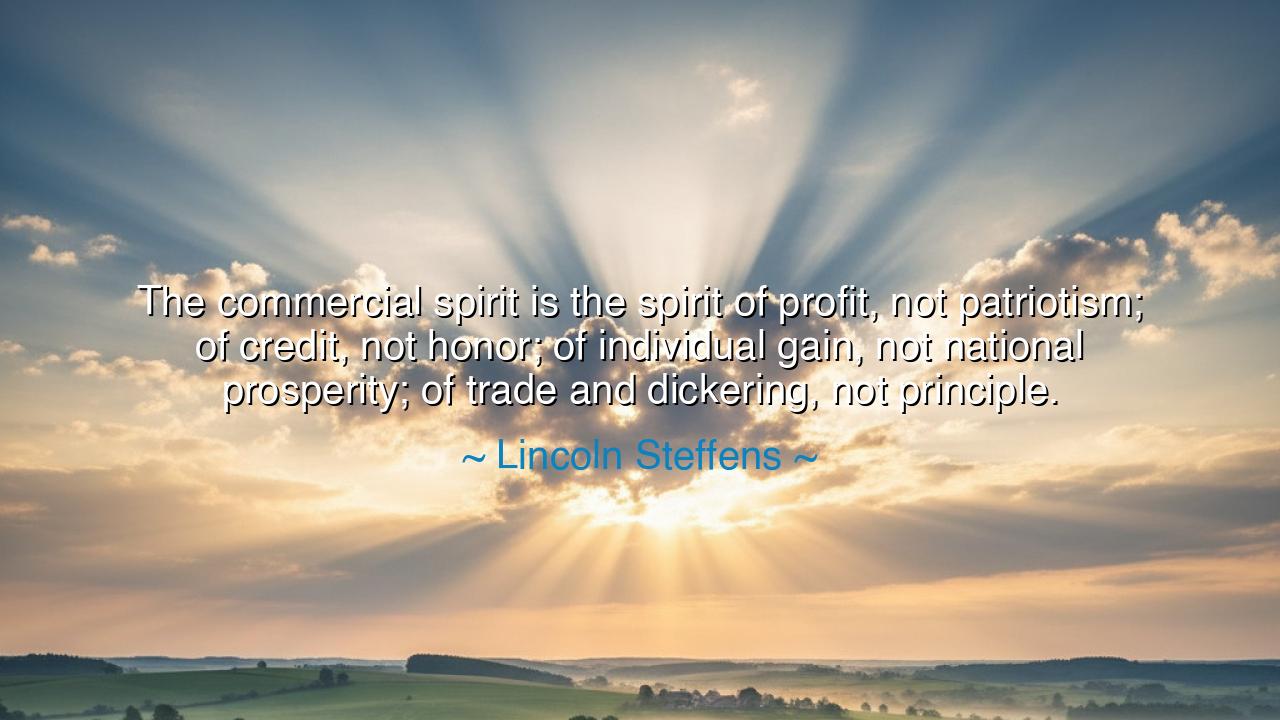
The commercial spirit is the spirit of profit, not patriotism;
The commercial spirit is the spirit of profit, not patriotism; of credit, not honor; of individual gain, not national prosperity; of trade and dickering, not principle.






The journalist and social critic Lincoln Steffens once thundered: “The commercial spirit is the spirit of profit, not patriotism; of credit, not honor; of individual gain, not national prosperity; of trade and dickering, not principle.” In these words lies a piercing indictment of societies that elevate wealth and personal advancement above moral and civic duty. Steffens warns that when the pursuit of gain supplants the love of country, the virtues that sustain a nation—patriotism, honor, and collective prosperity—fade into shadow. The commercial spirit, he asserts, is not inherently virtuous; it must be tempered by principle and guided by the common good.
In the eyes of the ancients, commerce was a tool, not an end in itself. Aristotle and Cicero taught that wealth serves the polis only when it is harnessed for justice, civic duty, and the welfare of all citizens. Steffens echoes this timeless insight, reminding us that trade and profit, if divorced from principle, become instruments of selfishness rather than pillars of national life. Patriotism, in contrast, demands that individual pursuits be aligned with the well-being of the community, that private ambition never eclipse public virtue.
History offers vivid lessons of this principle. Consider the rampant corruption of the Gilded Age in America. Industrialists and financiers amassed unimaginable wealth, yet often at the expense of workers, communities, and public institutions. Bribery, exploitation, and monopolistic practices reflected a commercial spirit untethered from honor or national welfare. Steffens himself documented these abuses in his muckraking journalism, exposing the moral cost of elevating profit above principle and revealing the fragility of a society that mistakes individual gain for national strength.
Steffens’ reflection also illuminates the difference between credit and honor. In a commercialized society, reputation may be purchased, influence negotiated, and power bartered. True honor, however, arises from ethical action, courage, and fidelity to principle. When individuals and institutions prioritize credit over honor, deals over integrity, and profit over the common good, patriotism becomes hollow. The love of country is measured not in balance sheets, but in service, sacrifice, and the pursuit of justice.
Consider the story of George Washington and his careful management of the young American republic. Unlike many of his contemporaries who might have used power for personal enrichment, Washington placed national interest above personal profit, refusing positions or opportunities that conflicted with public welfare. His example stands as a counterpoint to the commercial spirit Steffens critiques: patriotism, honor, and national prosperity must guide individual actions, not the lure of wealth or personal advantage.
The deeper meaning of Steffens’ words is a warning against moral myopia. Nations flourish when citizens act with integrity, vision, and collective responsibility. They falter when private gain eclipses civic duty, when trade and negotiation become substitutes for principle. Patriotism, therefore, is a moral compass, guiding economic and political action toward the flourishing of the nation as a whole, rather than the enrichment of a few.
From this teaching emerges a vital lesson: wealth and commerce are neither evil nor inherently virtuous; their value is determined by the principles that guide them. Elevate national prosperity and civic honor above personal gain. Measure success not solely by credit, profit, or trade, but by the ethical impact of one’s actions on the community and the country.
Practically, this calls citizens and leaders to integrate ethics into commerce and governance. Advocate for transparency, fairness, and accountability. Ensure that business, trade, and investment serve not only private interests but the broader good. Invest in institutions, education, and public welfare as diligently as you pursue profit. In doing so, one embodies Steffens’ vision: a nation where patriotism, honor, principle, and collective prosperity guide the spirit of commerce, rather than subjugating them to mere personal gain.






AAdministratorAdministrator
Welcome, honored guests. Please leave a comment, we will respond soon